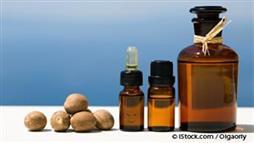Nutmeg Oil!
If You Enjoy the Taste of Nutmeg, You’ll Probably Love Its Essential Oil, Too
- August 31, 2017 • 293,899 views

Story at-a-glance
- Nutmeg, or Myristica fragrans, isn’t just a popular ingredient for cooking. It is also very much present in the alternative health scene. As an essential oil, it is used as a natural treatment for digestive problems, arthritis and other health conditions
Early European explorers had traveled all over the world to find spices such as nutmeg with good reason. Nutmeg, or Myristica fragrans, isn’t just a popular ingredient for cooking. It also possesses therapeutic properties, which made it a part of ancient cultures that include traditional Chinese and Indian medicine.1
Today, nutmeg is very much present in the alternative health scene. As an essential oil, it is used as a natural treatment for digestive problems, arthritis and other health conditions. Using nutmeg oil has a number of benefits, which I’ll discuss below.
What Is Nutmeg Oil?
Nutmeg essential oil is obtained by steam-distilling the dried kernels of the ripe seeds of the nutmeg. This fruit is native to Moluccas Island, in an area also known as the Spice Islands, but is also grown in Java (Indonesia), Penang (Malaysia) and Sri Lanka.2 The evergreen tree from which nutmeg is derived also produces another type of spice: mace.
The essential oil of nutmeg was used by various civilizations:3 Indians used it to help treat intestinal problems, while the Egyptians used it for embalming the dead. During the Elizabethan era, nutmeg oil was believed to be effective against the plague and gained great popularity, but with a high price4 as sellers took advantage of even the most poor by charging exorbitant prices for it.
Interestingly, modern research shows the Elizabethans may have been on to something, as nutmeg has antibacterial properties that work against 25 different bacteria including those of both plant and animal pathogens. Nutmeg oil was also used in Ayurvedic practices, mainly for treating fever, respiratory problems, headaches and digestive discomfort.5 Today, the essential oil is added to soap, candles, dental products and personal care products.
Uses of Nutmeg Oil
Nutmeg oil has a long list of uses, aside from being a natural cure for common health conditions. Below are just a few of the many uses for which it is known:6, 7, 8, 9
| Address bad breath — Nutmeg oil, when used as a gargle, helps address bad breath. It can also help eliminate toxins from your gut that may contribute to foul-smelling breath. |
| Massage oil — When used for massage, nutmeg essential oil not only can help relieve muscle pain, swelling and inflammation, but also promote circulation. Oil of nutmeg can also be used as a natural painkiller and treat menstrual discomfort. |
| Sleeping aid — Nutmeg oil has a sedative and calming effect. It can relieve stress, helping improve the quality of sleep and make dreams more intense and colorful. |
| Stimulant — Nutmeg oil can help remove exhaustion and treat anxiety-related symptoms. It can also enhance your concentration. |
| Detoxification agent — This oil helps remove toxins from your liver and kidneys, as well as dissolve kidney stonesand uric acid. |
| Flavoring agent — To replace ground nutmeg, which can leave food particles in food and beverages, nutmeg oil has been used as a natural flavoring extract. |
Composition of Nutmeg Oil
There are several types of nutmeg oil and their compositions vary greatly depending on where the plant was cultivated. However, studies have shown similarities between the East Indian oils (those produced in Indonesia and other parts of Southeast Asia) and the West Indian samples (oils created in Grenada and the Caribbean).10
The main constituents of nutmeg essential oil found in both varieties include sabiene, alpha-pinene, beta-pinene, myrcene, limonene, terpenes, safrole and myristicin.11 West Indian oils often have higher amounts of alpha-pinene, beta-pinene and sabiene (which comprise about 40 to 50 percent of the oil), but have low amounts of safrole and myristicin. On the other hand, East Indian oils have more myristicin content.12
Benefits of Nutmeg Oil
Numerous studies have shown that nutmeg essential oil and its chemical compounds have beneficial properties that make it useful for the prevention of various conditions.13
In one study,14 it was found that the nutmeg essential oil contained several phytochemicals, such as alkaloids, steroids, tannins, flavonoids, phenolics and glycosides. This finding demonstrated nutmeg oil’s efficacy against various infectious diseases. Furthermore, nutmeg oil showed potent antimicrobial activity against the following infectious pathogenic strains: Bacillus subtilis, Escherichia coli and Saccharomyces cerevisiae.15
Experiments in animal studies determined that the essential oil of nutmeg possessed anticarcinogenic properties, as the compounds in the oil interfere with the activities of enzymes involved with the activation and detoxification of xenobiotic substances, such as carcinogens and mutagens.16 In both Western and Eastern medicine, nutmeg oil is known for its stimulant, carminative, astringent, deodorizing, narcotic and aphrodisiac properties. It is used to potentially address health problems such as:17, 18
| Kidney stones and bladder and urinary tract inflammation | Halitosis or bad breath |
| Digestive issues, such as dyspepsia and flatulence | Impotence |
| Insomnia | Skin conditions |
| Joint and muscle pain | Menstrual cramps and hormonal imbalance |
| Low blood pressure | Respiratory problems, such as colds and asthma |
How to Make Infused Nutmeg Oil
The essential oil of nutmeg is extracted through steam distillation of the dried seeds of the nutmeg fruit. However, like any other plant oil, you can make an infused version at home. Below is an easy-to-follow recipe for infused nutmeg oil from The Coco Magazine.19Please remember that this recipe yields a product that’s not as concentrated as pure nutmeg oil.
What You’ll Need
- Carrier oils, such as grapeseed oil
- Whole nutmegs
- Mortar and pestle
- Measuring cup
- 8-ounce Mason jars
- Glass bowl
- Funnel
- Dark-colored glass container with lid or cover
Procedure
- Using the mortar and pestle, crush the nutmegs to release their aroma. Another way would be to grate them. However, do not grate to a fine powder.
- Place 1/2 cup of the crushed nutmegs in the Mason jar.
- Pour 1/2 cup of carrier oil over the crushed nutmeg until completely submerged.
- Seal the Mason jar and shake the mixture. This will allow the nutmeg oil to mix with the carrier oil.
- Leave the jar in a place with access to direct sunlight or heat for at least 48 hours. Remember to shake the mixture every 12 hours.
- After 48 hours, strain the oil into a glass bowl and discard the used spices.
- Transfer the oil back to the major jar and add a new batch of crushed nutmeg, then repeat steps 4 to 7.
- Check the fragrance. If it has reached the point of your liking, store the oil in a dark-colored glass container using a funnel, then seal and keep away from sunlight.
Notes:
- This oil is only for topical application.
- Shelf life of this infused oil is six to 12 months, if kept in a dry, dark, place.
- The strength of the oil will depend on how fresh and mature the nutmegs are.
How Does Nutmeg Oil Work?
Similar to other essential oils, nutmeg essential oil can be inhaled or applied topically. The essential oil is also approved as a food additive by the U.S. Food and Drug Administration (FDA).20 It possesses a “generally regarded as safe” (GRAS) for ingestion rating by the FDA,21 but I only advise taking it internally in the presence of your physician or an experienced aromatherapy practitioner. Below are some ways you can enjoy the benefits of nutmeg essential oil:22
| Help ease digestive problems: Add 5 to 6 drops of this oil in warm bath water or blend 3 drops with a carrier oil and use as massage oil to help address appetite loss, nausea, diarrhea, gas, constipation and gallstones. |
| Help relieve pain: Massage 2 to 3 drops with coconut oil to the affected area. |
| Prevent bad breath: Add 2 drops to lukewarm water and use as gargle. |
| Improve concentration and memory: Add 2 drops on a cloth and inhale. |
| De-stress: Add two drops to your diffuser. |
| Reduce swelling in gums: Apply a drop of nutmeg oil to a cotton swab and apply it around aching gums. |
| Induce peaceful sleep: Add 2 drops to a cloth and place beside your pillows. |
| Relieve respiratory problems: Use in steam inhalation to address congestion. |
Is Nutmeg Oil Safe?
Like with other essential oils, nutmeg plant oil is very concentrated and should never be used undiluted. Make sure that it is diluted with a carrier oil, such as grapeseed oil, olive oil, coconut oil, or almond oil. To check if you have sensitivities to this oil, I advise applying a drop of it to a small area of your skin and observe for any adverse reactions.
Some parties are concerned about the use of nutmeg because of its myristicin content,23 which has been said to have hallucinogenic properties. Know that this chemical compound is only dangerous when isolated and the essential oil contains only about 4 percent. Use the oil in moderation.
Because the oil can act as a stimulant, it should not be used by people with epilepsy. Pregnant women should also exercise extreme caution. I urge you to consult a doctor before use. Children below 6 years should be kept away from this essential oil, as they may experience sensitivities.24
Side Effects of Nutmeg Oil
Excessive use of nutmeg oil by inhalation or ingestion can lead to hallucinations, visual impairment, delirium and prolonged sleep.25 It can act as a stimulant or a depressant of your central nervous system. Overdosing can lead to side effects, such as convulsions, vomiting and delirium. I recommend consulting your physician or a trained aromatherapist before using nutmeg essential oil or any herbal oil.

















